This post may contain affiliate links.
Defining Balance
When I set out to write this, I quickly realized that keeping your balance is a lot easier than defining it. So I turned to the dictionary. Webster’s defines balance as:
bal·ance noun \ˈba-lən(t)s\
: the state of having your weight spread equally so that you do not fall
: the ability to move or to remain in a position without losing control or falling
It’s that second definition which is the functional, every day skill we’re most concerned with as we age. Just like starting a campfire, or unfolding a lawnchair, or even backing up your RV, there are lot of systems in the body that have to come together to pull this skill off. To have good balance, the following things have to coordinate and work together:
- The vision
- The inner ear
- The muscles and joints
- The Propioceptive system—specialized receptors that let you know where you are in space
Even if just one of these systems gets out of whack, it can produce balance problems. And we haven’t even mentioned the brain yet! So even when those systems are all working perfectly, the information still has to be accurately processed and interpreted by your brain. Finally, those instructions have to travel back out along your nerves so you can do something about it. Only then will you “keep your balance.”
Why It Declines as we Age
This is a complicated topic, but an important one considering the alarming rates of falls that occur in older adults. It’s easiest to address it by looking at the different systems involved in balance that we mentioned above.
- Vision: Our sight diminishes with age in many ways: ability to focus, see things clearly, depth perception, night vision, and the ability of your husband to pick the splinters that he got in the wood shop out of his own fingers instead of coming inside and interrupting what you’re doing for the fifteenth time. (Did I say that out loud?) The decline of these visual cues affects our balance, since the brain doesn’t have the same quality of visual information to work with as it once did.
- Inner Ear: Fluid and tiny hairs in the inner ear stimulate the auditory nerve, which gives us the ability to balance. However, cells in this system die off as we age. This affects how efficiently we detect our position in space and therefore how well we can correct our position. Basically, it becomes harder for the brain to interpret our position, and if we’re leaning too far left, for example, it might not detect our position quick enough to prevent us falling to the left.
- Muscles and joints: Not only do we lose muscle mass as we age, we also lose power. By power, I mean those rapid, strong movements which help us react quickly. If you begin to stumble over something, it’s your power that brings your leg around in a split second as you catch yourself and regain your balance. Your joints play an important role, too. Our joints get stiffer with age. Without a healthy range of motion in your joints, your body won’t be able to move and respond to tasks that require balance as easily.
- Propriocepton: As we age, our ability to orient ourselves and be aware of our surroundings dulls. I’ve read a lot of studies that show our sensory input declines with age, and I see it firsthand in my older clients. At this point, science doesn’t seem to have a generally accepted reason for this – we just know it happens. Without having our proprioceptors giving us quick and precise information about our whereabouts, our balance becomes greatly compromised. (I always wonder if those people who stand WAY too close to you in grocery stores and the like have problems with their proprioception…)
How To Improve It
Now for the good news: The more active you are, the more you can slow the process. No matter how old or at what stage in life, your balance can always be improved.
Earlier, we defined balance as an ability, or a skill. Just like any motor skill, you have to train your balance in the same way you train your muscles for strength or your heart for cardiovascular health. Skills and training will stick with us as we age, even if some of the supporting systems start to falter.
Think about it this way: Now in his 60s, Nolan Ryan may not throw a fastball with all the zip he once had – but he could still strike you out because his highly developed skills have stayed with him. As you develop your balance skills, they’ll stick with you too. Here are some things you can do right now to become a balance hall-of-famer.
- Test it: See where you’re starting out by trying a simple balance test. See how long you’re able to stand on one leg. The average 60 year old can do this for 27 seconds, while younger folks can go longer, and older folks tend to go less. If you can’t balance for 10 seconds, then you are at an extremely high risk of falling.
- Practice balance tasks regularly: This could be as simple as standing on one foot while waiting in lines or watching TV, or as challenging as practicing Get-Ups (lie on your back, and stand up with little to no help from your hands). The more you practice balancing, the better you’ll get.
- Work on your power: To combat the loss of power as we age, it’s important we do power-specific exercises, the type that calls for quick movements, like stamping your feet quickly, or rising to your tippy toes as fast as you can. Keeping up our power skills will help us react quickly if we trip, or find ourselves off balance.
And since there’s no time like the present, here are some balance exercises you can try right now!

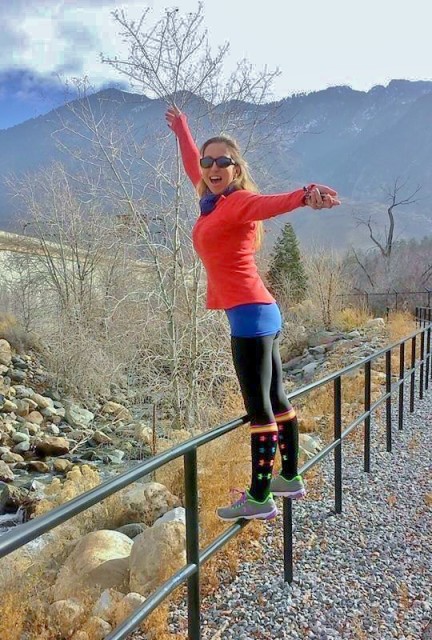


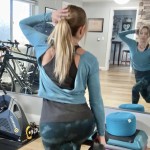
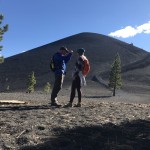
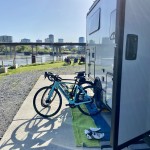
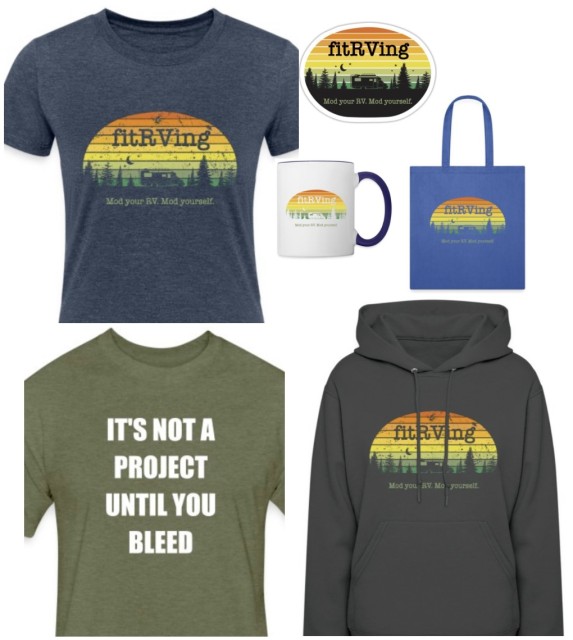




WOW Stef! I was “Digging” through this site and found this Article! SO timely for me as I recently turned 61 and have been noticing that my Balance has been “Off”. SO many great suggestions on how to improve. Have made a List of ALL the Exercises and will now be added to my daily routine! THANK YOU SO MUCH! ♥️
I’m so glad you found this helpful, Angel! Glad to hear you’re going to start targeting your balance more, good for you. Stay strong, and balanced!!!
What an excellent article Stef! I’ve just started to have hints of balance problems at 62 after recovering from a knee injury – a dance injury dang it! I’ve danced for an hour every day until just the last couple of years. Usually I hurt my knees dancing /
build them up biking and walking. Thanks for the reminder!
Ah bummer about your injury. Dancing is such a great way to maintain balance, too! Glad the article resonated and put balance practice back on your radar. Here’s hoping you’ll be dancing pain-free someday very soon!
Hi Stef,
My wife and I just turned 66 and are noticing the balance issue. Thankfully, we are working on a balance dome at the gym which should help. Besides being avid Travato RV’ers, we sail. Diminishing ability to keep a good balance on deck is a scary thought. We intend to sail for many more years. So, thanks for reminding us all to work on this issue and encouraging us to keep fit enough to enjoy our time left on this planet.
I am 73 and ride a lot of bicycle especially when we are camping. I ride all over
the campsite looking at all the other campers. I am also a Veteran so I go about
once a week to the Miami V. A. where I see World War 2 Veterans who are in their 90’s. Most of them need a cane or a walker to maintain their balance.
The big guns of war also did not do our hearing any good. I also use the balance ball at L.A. Fitness. Is there anything else you can recommend to enable me to
keep my balance for another 41 years until I am 120 years old ? LOL
Hi Mark! The BEST thing you can do for balance is exercise, exercise, exercise. We need to have strong bodies and stable joints in order to keep our balance, so staying fit is the foundation for good balance. At your age, you need to be exercising every single day. On top of that, practicing a few balance moves each day helps too. So you stand on one foot, you put one foot in front of the other in a heel to toe alignment and you lift to your tippy toes, you lean forward as if picking up something from floor and let one leg lift behind you…things like that. Any move that challenges your balance is balance exercise. Do a few every day on top of your regular exercise routine and you’ll be a balancing genius on your 120th birthday! Here’s to the next 41 years! xoxo
Recumbent trikes are a prime solution for people who have balance and leg strength issues including those in their 90’s or older.
Putting the parking brake on while sitting down on one or getting back off of one is helpful as well as special handles designed for that.
They will surprise you with the safe riding pleasure they make possible and most will quickly fold up for safe storage indoors or in RV”s.
They make riding all over a campsite a safe process for all concerned.
I am 65 and try to balance on alternating legs everyday I have tonitus on the left ear and it seems harder to balance on the left leg. Good article. I also liked your comparing induction with gas I have induction in my home and love it easy to clean cools quickly. Am hoping when we get our rv we can get the induction not gas.
Hi Sandy! Good for you for working on your balance every day. As long as you keep using it, you won’t lose it…so keep it up!
Hi Stef.
I’m an exercise teacher for the elderly in the U.K..
I often look up your ideas/routines on youtube for inspiration.
Good stuff. Have used many of your ideas…. Thanks.
Love
Sonja X
HI Sonja! That’s so nice to hear! Glad you found some inspiration in my exercise ideas. Health and happiness to you! xoxo
As a motorcyclist in my mid-60’s, I’ve noticed a somewhat scary sensation when I’m stopped at a red light — I have to keep my eyes focused steadily on the car stopped in front of me. If my eyes stray (to the sky, to birds, to the swaying red light podium, etc) I suddenly feel JUST A BIT dizzy. Very disconcerting. I will try the exercises you recommend. Thanks for this great analysis.
I bet that’s a scary sensation! At least you’re aware of it, and can work to minimize the sensation. I always talk to my clients about “work-arounds”. Whenever they have a problem, like your dizzy spell, try to find a “work-around” that will lessen it. Different sunglasses? Controlling your gaze? Experiment with various “work-arounds” and see if you can get a better handle on it. No one likes the sensation of being dizzy…no fun! Rooting for you! xoxo
Good article Stef! You rock! Such an important concept. We personally have gone from strength athletes to fitness athletes, all our weight workouts have evolved to the Bosu, the balance ball or on alternating feet. Maybe it’s because we are getting older, but it really is all about training smarter!
So true, Al and Sherryl! And glad to hear you’re using the BOSU…I LOVE LOVE LOVE that thing for balance and stability training!
Hi Stef,
Funny I should run into your article…I just started going to a local gym and started working with a trainer. As a newly-minted 61 yr. old, I knew several things were not quite as they should be, and BALANCE turns out to be one of them! With my trainer, I did an exercise where I stood on one foot and tossed a cantaloupe-sized ball back and forth. I was surprised at how hard it was for me to stay upright, let alone catch and toss a ball!
Thanks for drawing my attention to something other than the noise characteristics of generators and the differences in black tank drain systems. I have some work to do and your piece (and others) will help a great deal.
Our bodies ultimately are more important than our RV’s and something only we can do anything about!
Tom
I love your last sentence, Tom. So so so true! Glad you’re working with a trainer…a big financial commitment, but it’s hard to put a price on improved vigor & vitality. Yup, balance is often overlooked in the fitness realm, and I’m not sure why, especially with the alarming rate of falls with older adults. Good for you for working to improve yours!